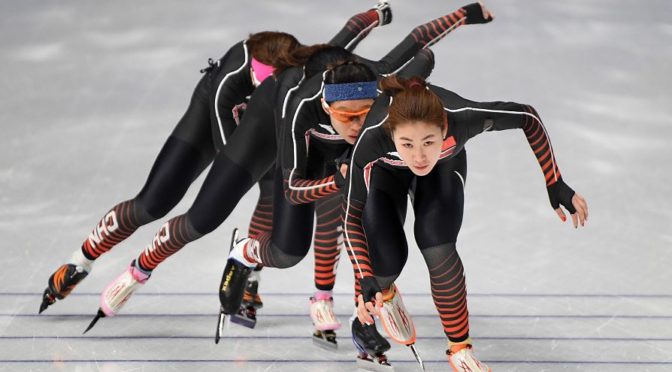Here is a summary of this week’s China Sports column for SupChina, which was first published here.
The long-term goal remains 2022, but China still has several medal hopes in Pyeongchang.
The host nation of every Olympic Games – whether Summer or Winter – typically does much better than usual in the medal standings, due to a combination of factors including increased funding and fanatical home support. The host country also tends to gets a bump, albeit a smaller one, in the two Olympics immediately before and after.
With the Olympic Games heading for Beijing in 2022, you might expect China to start raking in the medals in Pyeongchang.
Unfortunately, however, the Chinese don‘t see it quite that way – and they may well be right.
Here’s the thing: nine of China’s 12 gold medals in the Winter Olympics have come in short track speed skating – all won by women – but one of China’s largest rivals in the sport is South Korea, who will be expecting a huge boost in fortunes as the host nation, rather taking the wind out of China’s sails.
But it’s not all doom and gloom.
The Associated Press predicts China will win three gold and three silver medals over the next two weeks, while the Olympic predictors extraordinaire, Gracenote, forecast a total of ten medals for China, of which they expect six to be gold.
Here’s a round-up of some of China’s best medal hopes, who, if they see success in Pyeongchang this month, could become huge domestic stars four years from now.
China has been very successful converting second-tier gymnasts into top-level aerial skiers – the sport, after all, is effectively gymnastics on skis. Xu Mengtao, runner-up four years ago and this season’s World Cup champion, is widely tipped to win the women’s competition, while Qi Guangpu and Jia Zongyang both have medal chances in a competitive men’s division.
In pairs figure skating, Nielsen’s Gracenote modeling software says Sui Wenjing and Han Cong will claim the title, while the Associated Press marks them down for silver. They would be hugely popular winners if they could reclaim for China the title that Shen Xue and Zhao Hongbo famously won in Vancouver eight years ago. Su and Han won gold at last year’s World Championships, but have been carrying some minor injuries in recent weeks. Meanwhile, in the men’s singles, 20-year-old Jin Boyang has put himself in contention following a World bronze a year ago.
As usual, though, it’s short track speed skating that provides China with its best hopes of a sizeable medal haul. Wu Dajing (men’s 500m) and – if fit – Han Tianyu (men’s 1,500m) have been tipped for success alongside the men’s 5,000m relay, while on the women’s side, Fan Kexin and Zhou Yang will both line up for the women’s 500m, while the 3,000m relay team is also strong. Again, some of their main competition comes from the South Koreans, but short track can be so unpredictable, with dramatic falls a regular feature of races. Make sure you tune into the finals if you can.
Sporting action already began on Thursday, ahead of Friday’s opening ceremony, with China’s mixed gender curling team narrowly defeated 7-5 by Switzerland. But the Swiss are very strong and China, which has made big strides in the sport over the past few Olympic cycles, still harbors medal ambitions. [UPDATE: After a poor start, China has rallied and face Norway in a playoff on Sunday for the final spot in the last four.]
However, it’s in some of the younger, cooler sports that the IOC has been so keen to reach where China has been looking to make the biggest breakthroughs. Both the Gracenote soothsayers and the AP predict silver for Cai Xuetong in the women’s snowboard halfpipe, behind the ethnically-Korean US star Chloe Kim, who at 17, is already leagues above the competition and poised to be one of the stars of the Games. Liu Jiayu could also challenge for a halfpipe medal having shown good form in the World Cup this season, as could Zhang Yiwei on the men’s side.
But a consistent theme in state media in recent weeks has been about getting experience and building for 2022 – with 2018 simply one stop along a more important journey.
15-year-old Zhang Kexin became the second-youngest female freestyle skier from any nation to win a World Cup halfpipe gold medal last year. Meanwhile, 17-year-old Guan Ziyan and 20-year-old Wang Jin compete in the moguls and have said they are specifically concentrating on the Beijing Games in four years. Their US coach Scott Rawles, who has been with the team since October 2014, pointed out that in the west, kids often start skiing between the ages of three and seven, whereas some of his skiers only started at 15.
However, what Chinese has done so well in the Summer Olympics is to monopolize sports and disciplines that are not universally popular, as well as to play the number games to great effect in more repetitive, individual sports, like gymnastics and diving.
It’s no accident, then, that China will enter athletes in ten events for the first time, making its debut in sports such as bobsled and parallel giant slalom in snowboarding.
Don’t expect any medals in these newer disciplines this time around, and brace for plenty of media coverage about “experience”, especially if the medals don’t flow too freely.
But four years from now, after a fully-funded, professional training regime that few other countries can match, don’t be surprised in 2022 when Chinese athletes start popping up on podiums everywhere.


